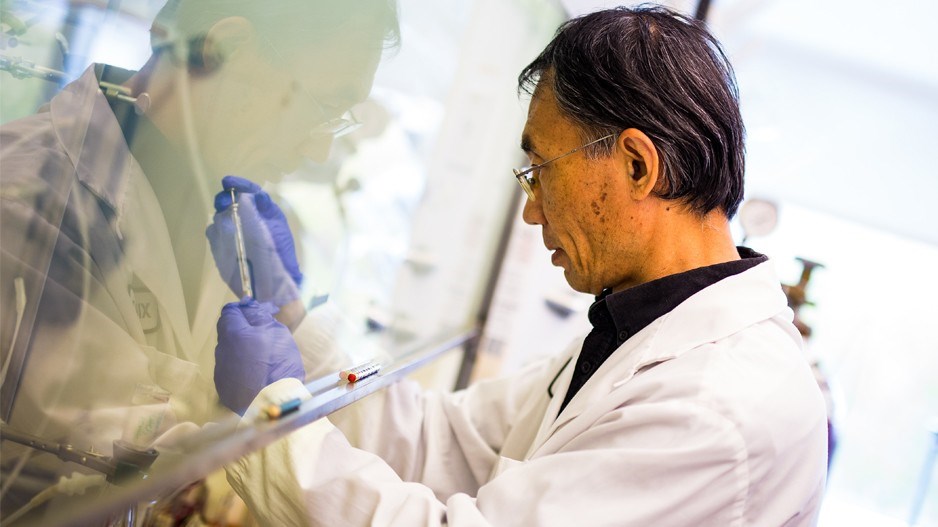News of a prototype COVID-19 vaccine showing a 90% effective rate at thwarting the novel coronavirus has sent global stock markets into a frenzy, but few people know that a Vancouver company is playing a key role in making the vaccine a reality.
U.S. pharmaceutical giant Pfizer Inc. (NYSE:PFE) and Germany’s BioNTech SE (Nasdaq:BNTX) last week announced that its vaccine has proven to be highly effective in early testing against COVID-19.
But without Vancouver-based Acuitas Therapeutics, none of that potential success may have been possible. Acuitas, founded by research veteran Thomas Madden more than a decade ago, developed the lipid nanoparticle technology (LNP) that allows the Pfizer/BioNTech vaccine’s “messenger RNA” (mRNA) technology to work.
“With mRNA, what we are doing is providing instructions to the cells in our body to make a component – a protein on the surface – of the COVID-19 virus,” said Madden, president and CEO of Acuitas. “And when our body produces that protein, our immune system recognizes it as being foreign and produces a response against it.”
The challenge, Madden said, is that, when injected, mRNA is easily broken down by the body. The mRNA also cannot enter human body cells without help. Enter Acuitas’s LNP technology, which essentially acts as a delivery vehicle for the mRNA to travel through the human body and enter the cells unharmed.
Madden said Vancouver is highly regarded within the global bio-sciences community for its LNP delivery technology. That reputation began when University of British Columbia (UBC) researchers – specifically leading nanomedicine researcher Pieter Cullis – led the world’s first LNP technology research effort.
Madden was a UBC faculty member in the same research realm, and Acuitas, which was founded in 2009 and now has 29 employees, is the latest company in a long line of firms that attempted to commercialize LNP.
“We have a concentration of talent and expertise in this area that is second to none, and it’s only now with COVID-19 that there’s a broader recognition of how important a contribution a Vancouver company is making to the development of this vaccine,” Madden said. “As part of that larger team, we’ve been developing this for many, many years, and several companies have been spun out of the research being done at UBC.”
He added that another two ongoing COVID vaccine projects – one with CureVac, another with the Imperial College of London – are working with Acuitas on LNP delivery systems for their versions of the medicine.
CureVac had been working with Acuitas on using LNP for a new rabies vaccine prior to the COVID-19 outbreak, and Madden said the market will soon see many more medical uses of Acuitas’ technology beyond the current pandemic.
“One of the strengths of this technology is that it is very easy to generate a message based on any protein that you would want to express,” Madden said. “So in the event that there’s a new viral threat, as soon as we have sequenced that virus, we can quickly make an mRNA to express one of the virus’s proteins as a vaccine candidate.”
He noted that Pfizer has indicated it will complete its data collection by the end of November. Regulatory agencies might therefore begin assessing the product before the end of the year.
The challenge in getting the vaccine to the general public, Madden said, will be manufacturing, which could take months to gear up. But he is also hopeful that the Pfizer vaccine will not be the only one approved for production by that time, and the parallel development/production of a wide range of vaccines along different supply chains will accelerate its availability worldwide.
“It think it certainly provides an excellent example of how a company can thrive in the Vancouver area,” he said of Acuitas’ COVID-related success. “It shows how academic roots can be translated very successfully to commercial and technical success. At the same time, I think we have to realize that Vancouver is not a biotechnology hub. We lack some of the other components that really foster the entrepreneurial development here.”
Those components, he said, include the venture capital needed to nurture startups.
Madden noted that the Pfizer/BioNTech vaccine news was a watershed moment for the Vancouver firm’s researchers.
“Our team has been working since February, seven days a week, as many hours in a day as they can, all to support the development of these vaccines. It’s been an amazing couple of days.” •




